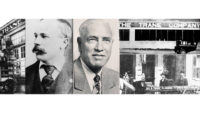Dan Holohan: Who's driving the truck?
What do contractors want from your delivery team?

FG Trade / E+ via Getty Images
My first job in this business was to be a truck driver for an AC/Refrigeration wholesaler on Long Island. I didn’t have a car at the time, so I walked a mile to the branch and loaded a box truck, which I then drove 30 miles east to the branch where I would spend my days. Once there, I unloaded the transfer stock, reloaded for the local deliveries, and then drove off to learn about life.
There was a (now long-gone) psychiatric hospital in the area and I went there to deliver some refrigerant. It was my first time on the property. The place was a huge campus with many buildings and I didn’t know where to go once I arrived.
I spotted two men strolling the grounds and asked if they could help me. The larger of the two nodded enthusiastically and told me to pull over to the curb. He and his pal then got into the truck and unloaded its entire contents onto the street. I tried to explain that they were only supposed to get some refrigerant, but they ignored me and continued to sing “I've been working on the railroad.”
Recalling where I was, I just stood back and watched.
When the truck was empty, they both clapped me on the back, thanked me, and walked away, still singing.
I left that job six weeks later, having learned that it is not easy being the delivery guy.
I was remembering that day when I asked the pros on The Wall at HeatingHelp.com, what they look for in a wholesaler when it comes to getting the goods to the jobsite. What makes them want to always buy from that wholesaler, or not. I think what they had to say could be helpful to you, so here goes:
A contractor from New Jersey, who works alone, said: “Most of the big guys just deliver to the curb. Usually, they won’t take any of the crates or the wood away. They’re always in a hurry. I deal with one supply house that has a driver who will help if you’re a long-time customer and pay your bills on time. He’ll help me get the boiler down the basement, and the old one out. He’ll even take the pallet, cardboard, and scrap off my hands. But of course I always tip well for this service.”
That made me think about the appliance-store men that delivered a fridge to our neighbor the other day. The two guys showed up, uncrated the fridge, brought it into the house, installed it, and took away the old one. I realize that’s standard practice for that business, but it made me wonder whether that business model would be good for the PHC business as well. And I understand that when you order an appliance you pay extra for that service, but would contractors pay extra for a little help in the field? And would your insurance policy allow for that? Hmmm.
Another contractor, this one from the Bay Area in California said, “Cast-iron bathtubs and boilers, and china toilets are always a problem to move around. Many plumbers are physically small because they have to fit into tiny crawlspaces. I used to hire moving companies to place and remove large, heavy objects, such as an 8' x 8' fiberglass bathtub. My local supply house will remove and replace water heaters for us. I would choose them over another supplier that doesn't.”
Do you see an opportunity there? The driver and (perhaps) his helper won’t be doing the installation; they’ll just be there to help get the items where they need to be. That means a lot to a contractor, especially a physically small one.
A Connecticut contractor chimed in: “We have an exceptional delivery man where I buy. Johnny takes as much time as needed to move boilers, tubs, toilets, and stone-lined indirects into place, even if they have to go to the basement. He also removes and disposes of all the old equipment. I do tip well, depending on the degree of difficulty, and I don't mind paying that supplier’s 3% higher price for this courtesy.”
Food for thought?
A retired contractor said this:
“From the beginning of time (for me at least), our family business purchased all our boilers from Columbia. As I recall from my last Columbia boiler purchase, they still sent two people on the delivery truck; and those two put the boiler in the basement for us. They scrapped the old boiler (within reason), and took the crate with them. They did all this for a small fee, which was well worth it for a small outfit like ours. We didn’t want to have too much manpower on the job just to wait for a delivery truck to arrive. Their great service bought our total loyalty.”
Being a driver is not an easy job, but that person can make or break the company whose name is on that truck.
Contrast that with this:
“I’m a homeowner who has done multiple renovation jobs, plus new builds. My experience has been with a large local supply house chain whose delivery method was for the driver to back the truck up to an open garage door and then ask where the plumber was to help him unload. The materials would go into the garage but no further.
“We had a full bathroom renovation delivery, including Choreograph shower panels and sliding doors. Both my plumber and I made it clear in advance that it was a materials delivery only and that there would be no crew on site.
“Naturally, they sent only the driver, who refused to unload anything without help, and was prepared to just leave. Luckily, the heating tech we were using at that time arrived to do a burner tune-up and offered to help the driver unload. Otherwise all the materials, some of which had been on back-order for four months, would have stayed on the truck, or worse.
“That local supply house chain was bought out by a major chain a couple of years ago and I have no idea whether their delivery practices have changed.”
A wholesaler jumped into the conversation after that one, and he had a unique perspective no one else had yet considered:
“From our point of view,” he said. “I like it when our driver is able to move equipment into the jobsite and unpack it with the customer. It's nice to have someone there for the unboxing, so to speak. We’ve had lots of damaged-goods reports this year; and having our guy there to look at what he was delivering really helped us rule out many of those claims.”
That’s delicious food for thought.
Another contractor said, “When I was working commercial installs, we always dealt with the same three suppliers. Depending on the job location, there were maybe 20 different drivers I had the pleasure of taking deliveries from, two of which would help by taking the smaller boxes off the truck and setting them near the back. The rest of the drivers would only leave the cab if they needed to pull straps from pipe bundles.
“A few years back when I started doing residential, I found a supplier who would deliver to my shop 60 miles away for free. I'm very seldom at the shop, but these gentlemen know my door code and will go so far as to even place the items on my shelf. A few weeks ago, I came home to seven Lochinvar, and four Electro boilers, neatly stacked on my pallet, in order from smallest to largest, each with its PO taped squarely in the top left corner of the box. I haven't even checked pricing elsewhere for the past two years, and all because of the hospitality I have received from that supplier.”
And finally, this from another contractor:
“I would hope supply-house owners recognize that their delivery people need to be a strong link, not a weak one. Those drivers operate equipment that can easily cost six figures to purchase, maintain, and operate. They handle millions of dollars worth of goods yearly. They are also their company’s job-site representatives.
“Driving and delivering should be a career with excellent pay and benefits, and good drivers should have an on-board helper, just like skilled trades do.”
As I learned on Long Island when I was quite wet behind the ears, being a driver is not an easy job, but that person can make or break the company whose name is on that truck.
Are you seeing the opportunities? How about the dangers?
Good.
Looking for a reprint of this article?
From high-res PDFs to custom plaques, order your copy today!







